In September the leaders of the world’s most powerful nations met in New Delhi for the annual G20 Summit to address such heady matters as the war between Russia and Ukraine, the future of energy production and the criticality of food security. Everyone smiled for the cameras, shook hands politely and agreed to do their best to do something about everything, just so long as they weren’t asked to make any enforceable commitments. At the end of the weekend, all the great men and women of the world put their shoes back on, took one more group photo and bid adieu to their friends (and enemies). Then they all headed for home.
All, that is, except one.
It is considered poor manners to overstay one’s welcome, particularly if one has just accused the host of carrying out assassinations on foreign soil, but Canadian prime minister Justin Trudeau nevertheless remained in India two days longer than expected. He didn’t stay because he wanted to, mind you, but because he had to. His plane wouldn’t fly. And so, while American president Joe Biden jetted off to Vietnam and then back to Alaska, and Chinese premier Li Qiang skimmed over the Himalayas on his way back to Beijing, and all of the rest of the important people went their merry ways, Justin Trudeau sat in his New Delhi hotel room waiting for the Royal Canadian Air Force to bring the parts to patch his plane back together.
A bit of bad luck, you might be tempted to call the prime minister’s transportation misfortunes. It could happen to anyone. The interesting bit, however, is that it doesn’t appear to happen to everyone, even as it does happen to Trudeau — over and over again. In 2016, Trudeau was on his way to sign a trade agreement in Belgium when his flight — only thirty minutes from home — had to circle back because of mechanical problems. Three years later, the prime minister’s plane smashed into a wall in Ontario and suffered “significant structural damage to the nose and right engine cowling.” While traveling in the backup plane, Trudeau was grounded in London on his way to a NATO summit, again because of mechanical difficulties.
In some ways, then, Justin Trudeau’s plane is the perfect metaphor for his entire premiership. These days, when you ponder economic basket cases, you usually think of the suddenly struggling Chinese economy, or the perpetually paralyzed Peronistas in Argentina, or even, perhaps, the erstwhile German economic powerhouse that is on an unprecedented course toward rapid deindustrialization. No one ever thinks of Canada as a failed economic state — but they should probably start. Over the last ten years, no industrialized nation has suffered as persistently slow economic growth as has Justin Trudeau’s Canada. The decade that roughly coincides with Trudeau’s reign has been the worst in the nation’s history since the Great Depression. While economists and market-watchers have spent the last year-plus arguing about whether the American economy will suffer as the result of rising interest rates or will somehow manage a soft landing, Trudeau’s economy — like his plane — isn’t going to land at all because it never got off the ground in the first place.
On September 1, Mikal Skuterud — an economics professor at the University of Waterloo and the director of the Canadian Labour Economics Forum — circulated a graph charting Canadian economic growth over the last five years. “Canada’s GDP per capita was higher in the second quarter of 2018 than it was in the second quarter of 2023,” Skuterud wrote. “Five years with no economic growth. Stunning. Absolutely stunning.”
Commenters defended the Canadian economy — and the Trudeau government, by extension — noting that population growth was a significant variable over the last five years, keeping the “per capita” number lower than might otherwise be the case. Others insisted that the Covid-created economic crisis was an inarguable drag on growth, distorting the numbers. And while these might be reasonable arguments in theory, they are unpersuasive in the real world. The United States, Canada’s closest economic analog, did far better over the same period of time despite taking in far more immigrants, as well as dealing with the very same pandemic. As Philip Cross, a senior fellow at the libertarian/conservative Canadian think tank, the Fraser Institute, notes, “the US outgrew [Canada] before, during and after the pandemic.” Between 2016 and 2022, Cross reports, “real per capita GDP rose 11.7 percent in the US, but only 2.8 percent in Canada.” This, he says, “shows that our stagnation was not the inevitable result of population aging or the exhaustion of technological innovations — which are hitting them, too — but instead reflects factors under our control.”
Professor Skuterud’s initial observation actually undersells the stagnation in the Canadian economy. Over the last decade (from 2014-23), the Canadian economy has grown at a proverbial snail’s pace, with per capita GDP inching up only 0.8 percent a year. That’s Canada’s slowest growth over a ten-year period since the 1930s. If that sounds like shockingly paltry economic growth for one of the world’s largest and most developed economies, that’s because it is. Marked by increased regulation and stultifying growth in the size, scope and cost of government, Trudeau’s economic record has been wretched.
That’s not to say that it can’t get worse.
It seems like ages ago now, but during the 1980s, many in the West fretted about the risk posed to the global order by the new economic powerhouse of Asia, the suddenly dominant economy of Japan. The Eighties were a period of strong growth and a potent economic rebound in the United States, and yet even Ronald Reagan’s “Morning in America” could not match the vibrancy and intensity of the Japanese rising sun, which outpaced American growth by more than 25 percent during the decade. From cars to electronics to the purchase of luxury real estate, the Japanese were infringing on the West’s economic dominion, threatening to upend four decades of unrivaled economic supremacy.
A funny thing happened on the way to the Japanese global economic takeover. The late Eighties brought a mild resurgence of inflation to Japan, followed by central bank rate hikes and the pricking of the nation’s equities and real estate bubbles. From 1989 to 1992, Japanese equities fell by some 60 percent. In 1992, the previously scorchingly hot Japanese real estate market began to cool and, in time, turned ice cold. Within a few months, the threat of Japanese global domination vanished, replaced by concern that Japanese economic malaise could result in global contagion with a setting sun plunging the world into economic darkness.
The era from 1992-2002 is nearly universally known as the Japanese “Lost Decade,” a period of stagnation, economic bewilderment and recurring monetary policy mistakes that left the formerly vigorous Japanese economy gasping for breath. The Lost Decade was profoundly painful. In addition to the wealth it destroyed on the personal and cumulative levels, it also took from Japan the opportunity to assert itself as an inarguable global economic force, to restore its place as a dominant power in the world, this time by virtue of its collective intellect, creativity and discipline rather than military might. Additionally, and perhaps most notably, the Lost Decade seemed to rob the nation of its ambition, leaving it more pacified than at any time since the bomb dropped on Nagasaki.
Japan’s “Lost Decade” has become a classic, universally recognized economic shorthand signifying “unusual or unexpected economic collapse in a developed economy, caused and exacerbated by economic illiteracy.” Japan’s total GDP growth rate and its per capita rate slowed to around 1 percent over the course of the crisis. Which is to say that during its most difficult and spirit-shattering period in postwar history, Japan remained more productive and more fecund than Canada’s economy has been, on a per capita basis, than under Trudeau.
You might be tempted to refer to Trudeau’s tenure as prime minister as Canada’s “Lost Decade,” were it not for one significant and worrisome caveat. Whereas the central bankers in Japan eventually quit making massive monetary policy mistakes that enabled the economy to recover, Trudeau appears merely to be getting started with his equally serious but far more obvious fiscal policy mistakes. In turn, that means that the worst may be yet to come. By the time Trudeau’s ineptitude and arrogance have unleashed their full destructive power, Canadians may look back at the last decade of stagnation with longing and nostalgia. Rather than “the Lost Decade,” they may see the first ten years of Trudeau’s (mis)rule as “the good old days.”
The differences between Japan’s economy in the 1980s and Canada’s economy today are significant and profound. That said, there are also genuine similarities that should give Canadians pause. For starters, both economies relied heavily on the growth in wealth resulting from a massive real estate bubble. Canada’s bubble was pricked in 2022, when inflation compelled central bankers to raise interest rates. Like Japan’s bubble, which deflated in late 1991, Canada’s has leaked significantly but slowly, meaning that there is still room for considerably greater deflation. Industry groups and market analysts expect that Canada’s real estate market will continue to deflate for the next several months and then rebound sometime in 2024, avoiding the Japanese real estate market’s fate. That outcome, though, is far from guaranteed.
One of the differences between Japan then and Canada now is that Japan’s central bankers overshot their inflation target, unleashing long-term deflation and a slow-burn real estate sell-off. Canada’s bankers, by contrast, have been comparatively cautious, which is why industry groups expect an eventual recovery in the market. The problem Canadian bankers face is their own government — Trudeau and his ministers — enacting fiscal policies likely to exacerbate inflation even as the bankers walk the monetary tightrope.
Most notably, Trudeau and his government have allowed ideology to get in the way of sound policy. In pursuit of his foolish but ambitious net-zero carbon emissions goals, Trudeau has added two consumer-level carbon taxes in the last several months, thereby adding to the cost of fuel; created a scheme by which lower and middle-class families will be compensated by the government for the extra taxes paid, thereby adding a new level of bureaucracy to the government management of energy and increasing government spending; and made it clear to provincial governments that they must transition their electrical grids to fossil-fuel-free generation as rapidly as possible, regardless of the cost, thereby contributing to potential rapid non-transportation energy costs.
Additionally, Trudeau’s government has accelerated plans to phase out fossil fuel production subsidies, moving their elimination up to this year. In July, environmental minister Steven Guilbeault told Bloomberg News that “Canada will no longer support subsidies that directly aim at the oil and gas sector and give the sector an advantage in comparison to other sectors.” This too will increase costs to consumers for fuel, threatening to keep inflation elevated, but it will also severely undermine Canada’s third-largest industry, natural resources and mining exportation. Three of Canada’s top exports — including its largest export, by a long way, crude oil — are petroleum products.
Justin Trudeau seems unconcerned about the damage the intended consequences of his policies will do to his nation’s economy and, by extension, its people. You can only imagine — and recoil in horror at — the potential damage his economic illiteracy will unleash.
The Canadian people will wish the Royal Air Force had had the foresight to leave the prime minister sitting in his hotel room in New Delhi indefinitely. You suspect that Trudeau would have run up a helluva room service bill — the man once racked up a $1,500 bar tab on a single flight — but that would be several orders of magnitude cheaper than the economic havoc he’ll wreak now that he’s home.
This article was originally published in The Spectator’s November 2023 World edition.



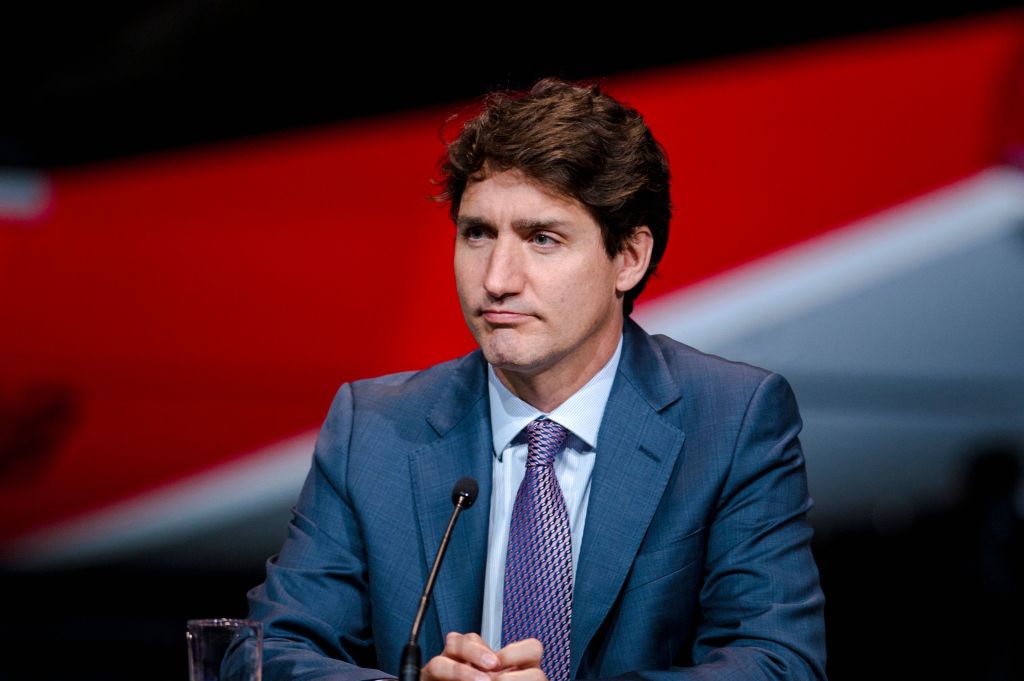






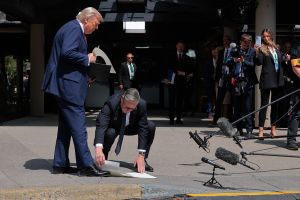
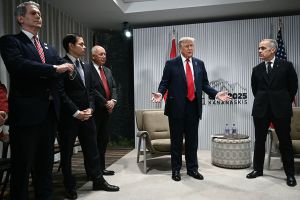



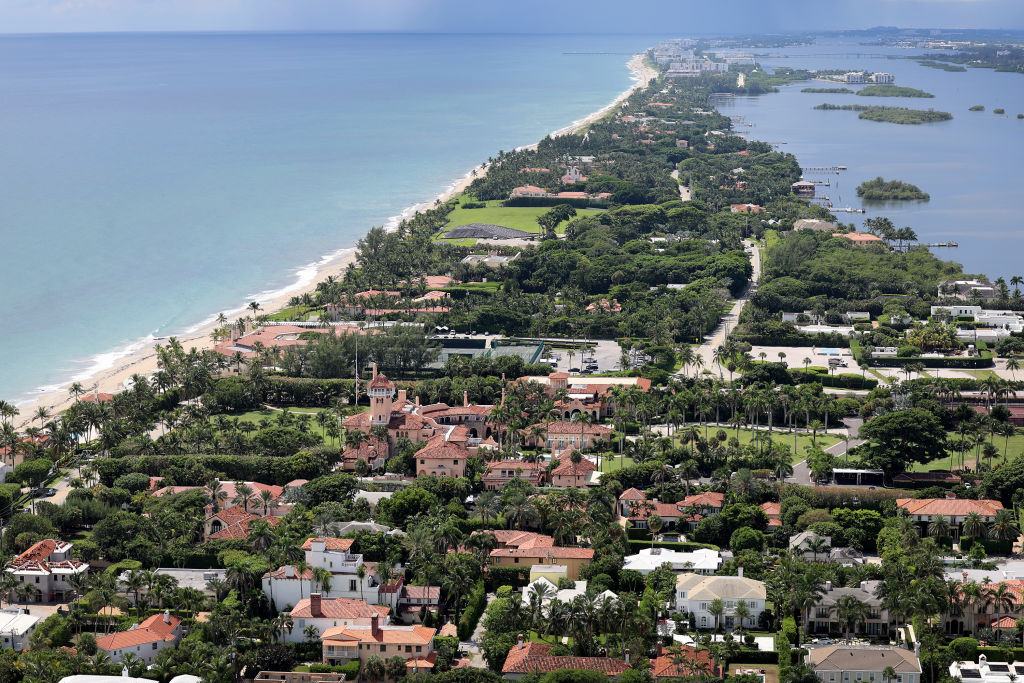
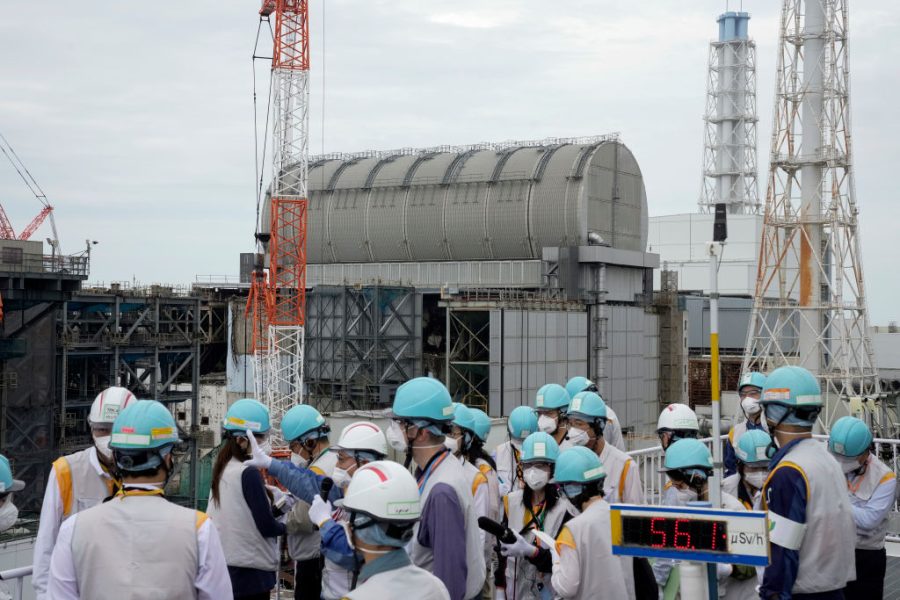
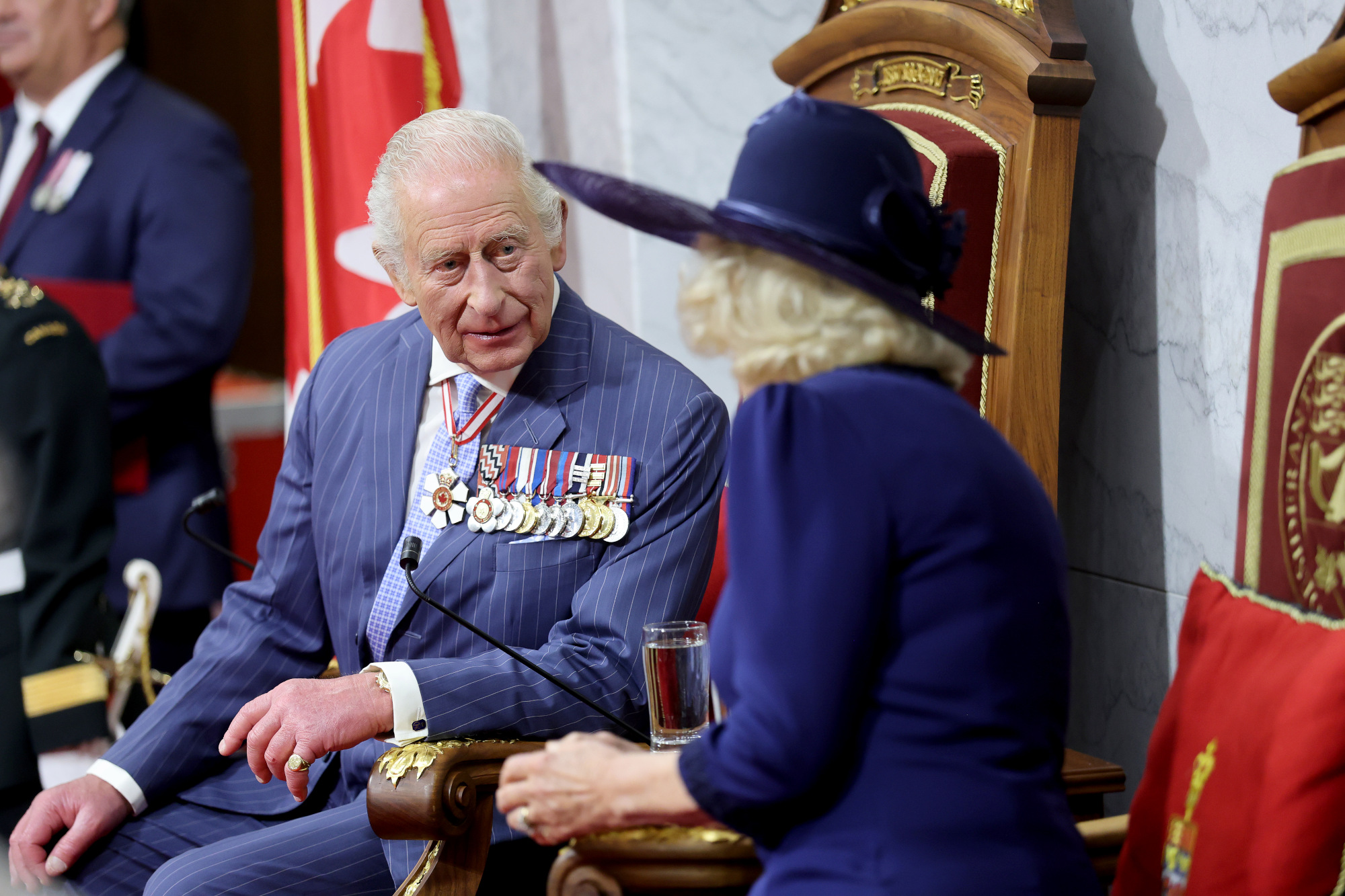








Leave a Reply